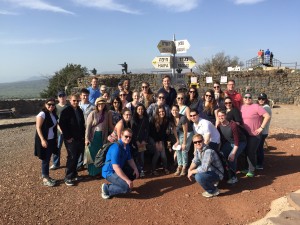Israel Reflections 2015 — Day Four: Har Bental
After our visit at Tzfat, we took a short bus ride into the northern hills to visit Har Bental, a lookout point on the edge of the Golan Heights. With a view into Lebanon, Syria, and Jordan, we could all see the importance of geography.
Student Nicholas Sinram shares his experience:
One of the many great experiences on our International Conflict Resolution trip to Israel was our visit to Har Bental. In addition to the salmon bagel lunch and the Druze fig jam, our excursion to Har Bental gave us the chance to experience the beauty and importance of the region. The visit to Har Bental also gave us the unique opportunity to learn more about the conflicts throughout the Middle East, the role of the international community in the region, and how this situation affects Israel specifically.
We had the amazing luck of running into two U.N. observers. They explained the roles of U.N. peacekeepers and observers.


 I’m very excited about this year’s Nies Lecture, which will be delivered by
I’m very excited about this year’s Nies Lecture, which will be delivered by